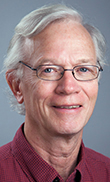Environmental researchers' outreach initiatives seek life enhancing solutions

Philip Berke
After each heavy rain last spring on the streets of Manchester, an impoverished, east Houston industrial neighborhood beset by flooding from Sims Bayou and pollution from nearby petrochemical plants, students from nearby Furr High School combed the neighborhood to map and test the toxicity of storm floodwaters and assess the quality of the community’s drainage infrastructure.
Trained by graduate [urban planning] (http://laup.arch.tamu.edu/academics/graduate/mup/) and public health students from Texas A&M, the high schoolers are part of an ongoing collaboration between residents of Manchester, home to many FHS students, and a small, multidisciplinary army of researchers engaged in Texas A&M’s Environmental Grand Challenge, a major initiative addressing critical environmental challenges affecting human health and well being.
Headed by Phil Berke, professor of urban planning, the EGC unites university scholars, activists and members of inner-city communities in research projects aimed at finding solutions to problems including natural disasters, pollution and flooding.
“In EGC projects, research concerning environmental challenges such as ecological degradation, poorly planned human settlements, underrepresentation of disadvantaged populations, and lack of access to healthy living environments and educational opportunities must involve an ongoing partnership with the people in affected communities,” said Berke.
“Left unaddressed, the scope of these already serious threats will grow even larger because of climate change,” he said. “Additionally, human activity is straining the planet's resources, degrading our environment and our ability to respond to and reverse these growing threats.”
The Texas A&M/Manchester partnership, which began in fall 2015, is transforming that community by providing extraordinary educational opportunities for its young people while gathering data to inform infrastructure development, community design options and municipal planning.
The collaboration helped Furr garner a $10 million [grant] (http://xqsuperschool.org/abouttheproject) from [XQ] (https://xqsuperschool.org) , a foundation that rewards schools creating new learning models for students seeking to excel in a world characterized by constant change.
The partnership, said Bertie Simmons, FHS principal, “was the part of our XQ proposal that generated the greatest excitement. We highlighted the learning that occurs in the natural environment,” she said, “and we also described how the collaboration has led to a lab at Furr where future teachers learn about meeting the needs of underserved youth.”
The collaboration is now a part of Furr’s “Genius Time” program, which offers a diverse set of educational opportunities that includes EGC data gathering, said Berke. “With ‘Genius Time,’” he added, “EGC researchers have a permanent connection to highly engaged, forward-thinking students who are interested in collecting environmental data.”
The Furr partnership helps Texas A&M researchers learn community problems directly from the people who live there. “So, we don’t just show up to a community and say, ‘we know what’s good for you, so here’s what our researchers are going to do,’” said Berke.
Additionally, Texas A&M’s [Texas Target Communities] (http://ttc.arch.tamu.edu) staff assists EGC initiatives, working directly with community members to identify issues. TTC offers long-term, integrated solutions to civic, environmental and economic challenges facing communities.
“One of the biggest issues we encountered in Manchester was their experience with past researchers, who went into their community, got what they needed, and never came back,” said Berke. “Texas A&M is building lasting relationships there because knowing what a community’s problems are produces better research and helps serve the members of the community,” he said.
Building on its successes in Manchester, this fall the EGC team expanded its reach to [Sunnyside] (https://www.google.com/maps/place/Sunnyside,+Houston,+TX/@29.6551706,-95.3792751,14z/data=!3m1!4b1!4m5!3m4!1s0x864095694dc47fb9:0x62b2b394b17aaba7!8m2!3d29.6631457!4d-95.3677844) , a community south of downtown Houston that Sunnyside Civic Association president Travis McGee called a "dumping field for anything that’s negative."
To establish a working relationship with the community, the EGC team met with representatives from [Charity Productions] (http://charity-productions.org/about/) , an outreach organization serving Sunnyside. An NSF-funded citizen science research initiative similar to the existing EGC project in Manchester will begin later this year.
EGC researchers will then begin projects focusing issues in Sunnyside related to human and environmental health, water security, and hazard mitigation.
The Environmental Grand Challenge is one of six areas of research, scholarly and creative activity focus championed in Texas A&M University’s effort to redefine fields of study, steer future pursuits and improve the quality of life in Texas and the world.
These grand challenge areas — energy, environment, economic development, educating leaders, strengthening democracy and human, animal and plant health — provide tough problems that can only be solved through large-scale collaboration involving experts representing the university’s full spectrum of knowledge and competencies.
As head of the EGC, Berke works closely with scholars and acts as a liaison to the university’s Office of the Provost and Executive Vice President, which oversees grand challenge initiatives.
Tags
- archone gallery
- climate
- coa gallery
- ecosystems
- graduate work
- hazards
- institute for sustainable communities
- lamp gallery
- land resources
- landscape architecture & urban planning
- outreach
- partnerships
- planning
- research
- rss
- sustainability
- texas target communities
- ttc
- urban systems
Related Posts

College community responds to Harvey
Follow Us
Facebook Twitter Vimeo Youtube Flickr RSS
Recent Posts

Planning prof heads study of disaster housing aid

A message from the dean

Former student remembered as expert planner

Leading educator named new head of Architecture Dept.










_thumbnail_small.png)
